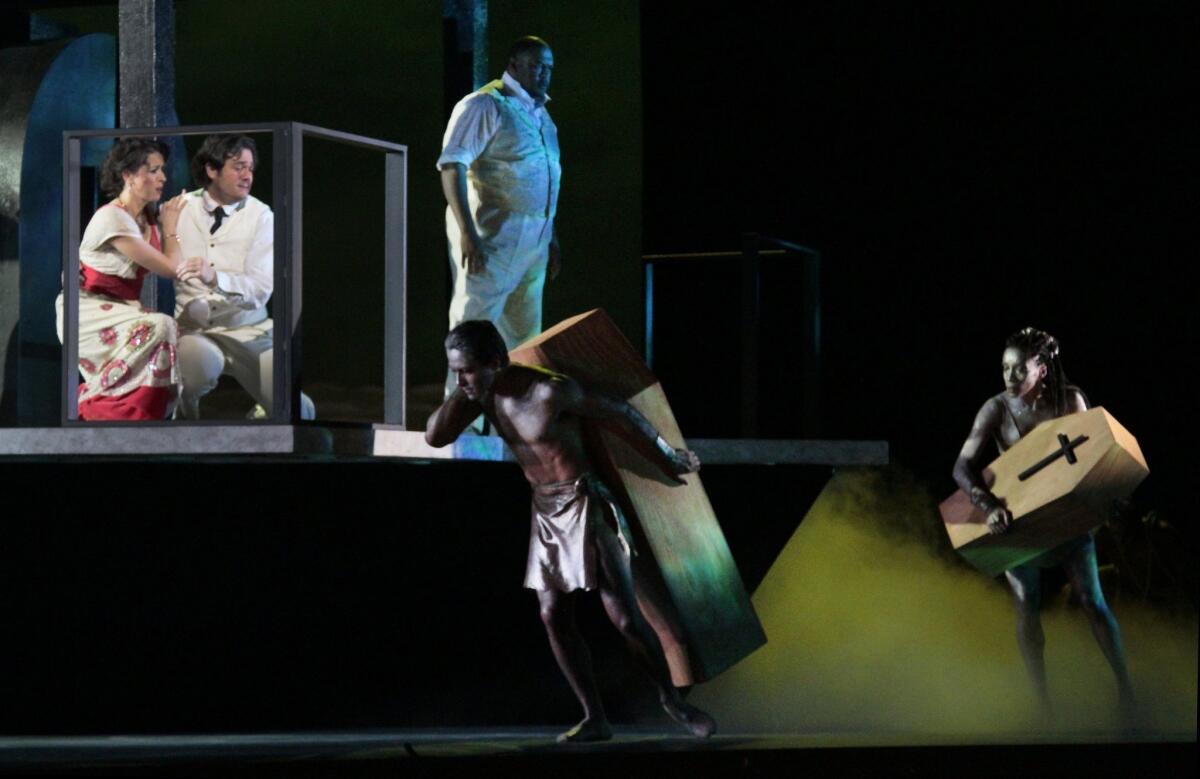Review: ‘Florencia en el Amazonas’ a culture clash solved by orchestra

- Share via
As the first opera by a Mexican composer and, astonishingly, the first Spanish-language opera commissioned by a major U.S. opera company, Daniel Catán’s “Florencia en el Amazonas” had by its very nature all the makings of becoming an operatic game-changer when it was first performed in Houston in 1996. Texans loved it. Angelenos loved it when it reached Los Angeles Opera the following year.
Catán, who lived in L.A. and died in 2011, became a beloved local composer and an international figure. At last, we had a new Spanish-language opera for a host of excellent native Spanish-speaking singers on the international circuit.
And finally, after 17 years, L.A. Opera returned “Florencia” to the Dorothy Chandler Pavilion on Saturday night in a modified version of Francesca Zambello’s original production. The game has by now long been changed. But as this revival makes curiously clear, not quite as we might have first imagined.
What struck the first-night audience as new in “Florencia” was not its Latin roots, essential though they were to Catán’s source and musical style. The inspiration for this story — of passengers on a ship traveling on the Amazon in the early 1900s to hear the return of a native opera star but discovering something else entirely — was the magic realism of Colombian novelist Gabriel García Márquez.
The inspiration for the gorgeous pigmentation of Catán’s atmospheric orchestral writing, the most original part of the score, was the Amazon itself, the magical sounds and sensations of the jungle. But the inspiration for the vocal lines was Puccini. That was a shock from a composer who had a background in North and Latin American as well as European, Modernism.
There is inevitably in “Florencia” a titillating tension between the sophisticated Latin instrumental writing and anachronistic Italianate singing. But it was hard to hear that at first. At the opera’s premiere, for instance, a distinguished European opera critic who was part of a large international press contingent that had traveled to Houston to hear what had been promoted as the most newsworthy new opera of the year, was in dismay; he complained that he could not possibly find a way to justify to his editors the expense of reporting on warmed-over verismo opera. No one in Germany would care, he insisted.
Americans did care. And Catán’s overt neo-Romanticism wound up as the main reason “Florencia” caught on (even in Europe) and helped generate a new genre of populist opera.
It is a little easier, although still somewhat problematic, to come to terms with Catán’s old and new in the L.A. Opera revival. Part of what made it easier was the outstanding conducting of Grant Gershon, who unraveled new layers of wonder in Catán’s orchestration. The pit, more than stage, is where most of the magical realism is realized.
Marcela Fuentes-Berain’s Márquez-manqué libretto populates the ship with characters who find love in the time of cholera. For two couples and the opera star, Florencia, the Amazon becomes a river of psychopharmacological properties, a drug that opens their various emotional blockages.
Florencia, who travels incognito, seeks fulfillment in a lost love of a butterfly hunter. The blockage of the young lovers, Rosalba and Arcadio, is their disdain for love. The blockage of middle-age lovers Paula and Álvaro is their familiarity. The Prospero-like Ríolobo, who serves as narrator, is the spirit of the river, able to command its mystical powers.
The Amazon has its work cut out for it, and Catán compensates for the libretto’s clumsy obviousness with shifting rhythms in the orchestra, where the rhythms are neither obvious nor clumsy. Lush, lurid climaxes are plentiful, but a brass undercurrent, with special credit to devious trombone glissandi, offers the aural impression of sand shifting underfoot.
New to Zambello’s unfussy production, which takes place on a minimalist ship designed by Robert Israel, are painterly Amazonian projections by S. Katy Tucker that add a nice touch. Eric Sean Fogel’s tasteful new choreography for five dancers symbolizes the river’s strange nature more effectively than does Ríolobo, a fairly wan character.
“Florencia” requires a parade of Puccinians, and L.A. Opera features five singers who are native Spanish speakers. Unfortunately, Chilean soprano Verónica Villarroel — a regular with the company in the 1990s who hasn’t performed in an opera here for a decade — comes vocally too late to the title role. But mezzo-soprano Nancy Fabiola Herrera provides a robust Paula, and soprano Lisette Oropesa, a brilliantly perky Rosalba.
Arturo Chacón-Cruz’s sweet and lithe tenor may be a shade too light for Arcadio, but he is an appealing presence onstage. Baritone José Carbó adds athletic grace to Ríolobo; Gordon Hawkins is an Álvaro with an edge; David Pittsinger, an affable ship’s captain.
All find their love and are transformed by it, but they are little more than the river’s Puccinian pawns. Thanks to the L.A. Opera orchestra, at least, this ol’ man Amazon really rolls along.
More to Read
The biggest entertainment stories
Get our big stories about Hollywood, film, television, music, arts, culture and more right in your inbox as soon as they publish.
You may occasionally receive promotional content from the Los Angeles Times.











